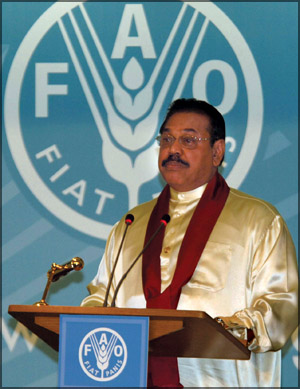Clarion call for urgent action on food crisis
| "The
world economy has run into a brick wall. Despite countless
warnings in recent years, about the need to address a
looming hunger crisis in poor countries and a looming,
energy crisis worldwide, world leaders failed to think
ahead.
The result is a global food
crisis, wheat, corn and rice prices have more than doubled
in the past two years, and oil prices have more than tripled
since the start of 2004. These food price increases,
combined with soaring energy costs will slow if not stop
economic growth in many parts of the world...."
Jeffrey D. Sachs (Author: The End of Poverty) |
Kalakeerthi Edwin Ariyadasa
This dramatic diagnosis of the global food crisis, by Prof. Jeffrey
D. Sachs, one of the world's most distinguished economists, could very
well serve as a stirring preamble to any discussion about the FAO World
Food Summit held in Rome recently.
The proceedings, deliberations and the outcomes of the food
conference, will undoubtedly have far-reaching repercussions on the
lives of a vast multitude of the people right round the globe.
Over and above the general impact that the Summit will register on
the global community has a distinct significance for us here in Sri
Lanka.
|

President Rajapaksa addressing the FAO summit |
It is primarily because, President Mahinda Rajapaksa was among the
world leaders who participated in the Food Summit.
The action-oriented, pragmatic approach that distinguished the
President's address, impressed the Summiteers and through them the
global community. His address to the Summit, revealing the stark truth
about the food crisis.
In the introductory segment of his address, the President focussed
directly on the victims of the global food crisis, establishing that,
around one billion people in the less developed countries, suffer the
worst effect of the food crisis. As has been estimated by the World
Bank, of the 11 billion living in poverty, Asians number most. But,
nearly half of the African population are tormented by the food crisis.
The implication of the President's statement was that the death of
eight million people each year due to poverty is an inescapable
accusation levelled against humanity. The President regretted that the
early warnings against the food crisis remained unheeded, until it
assumed the current, almost unmanageable proportions.
In his analysis, the President enumerated four major factors, that
led the world to the present menacing brink. According to him they are:
(1) the growing demand for fuel; (2) failure to act in time on climate
change; (3) the ravages of terrorism and (4) the problems in
distribution.
The President impressed the Summit by his admirable soul-searching
speech.
He dwelt at length on the prosperity, economic well-being and the
food security Sri Lanka enjoyed in the era when the focus on social and
economic development was the rural sector.
In his survey on the days of economic dominance by rural factors, the
President observed: "Rural incomes, rural well-being, rural
infrastructure, rural transport, rural education and other rural
services constituted the main goals and objectives of social
development.
The functional purpose of the President's emphasis on the shift from
a rural to an urban economy, was to underline that opening our doors
wide to global market forces which has resulted in our failure to
protect the national interest, relating to food security.
As the President interprets this economic transition tied up food
destiny, with fluctuating price-structures and changing global food
stocks entrapping most countries in escalated food-price levels, far
beyond expectations.
The spirit that pervaded his summit address, in the face of the
deepening global food crisis the President presented to the Global
Community a whole series of measures the country had adopted to counter
the food impasse.
The President kept the Summit informed about an integrated
nation-wide drive Sri Lanka has launched, under the title "Api Vavamu-Rata
Nagamu" (Let us Grow more food and build the Nation.) The President
indicated to the Summit, that he did not limit the move to the status of
an impressive slogan or to an airy ideal.
All the ingredients essential to realise the goal of the formulated
drive, were substantially provided to farmers.
The President undoubtedly convinced the Summit that the campaign
possessed pragmatism.
The President went on to elucidate "Village Modernisation" "Programme,
titled "Gama Nagamu" (uplifting the village). The central aim of this
project is to transform villages into the modern units of development,
while retaining their impressive strengths and features of rural life.
The goal of the project is to transform the food-producing villages,
into modern and sophisticated settlements equipped with state-of-the-art
infrastructure facilities.
Taking his concept further, the President elaborated the profile of
these production centres. Entering into the fray, brought about by the
competition between food and bio-fuel, he took up the firm stand that,
"no land that can be used for food, will be used for bio-fuel, whatever
the commercial attraction may be." |

